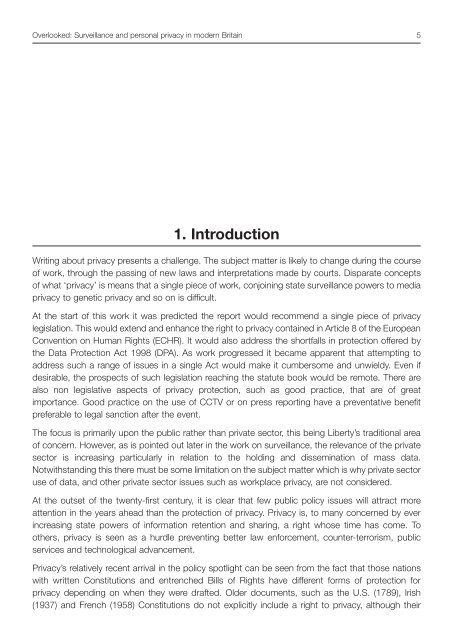Overlooked - Liberty
Overlooked - Liberty
Overlooked - Liberty
Create successful ePaper yourself
Turn your PDF publications into a flip-book with our unique Google optimized e-Paper software.
<strong>Overlooked</strong>: Surveillance and personal privacy in modern Britain 5<br />
1. Introduction<br />
Writing about privacy presents a challenge. The subject matter is likely to change during the course<br />
of work, through the passing of new laws and interpretations made by courts. Disparate concepts<br />
of what ‘privacy’ is means that a single piece of work, conjoining state surveillance powers to media<br />
privacy to genetic privacy and so on is difficult.<br />
At the start of this work it was predicted the report would recommend a single piece of privacy<br />
legislation. This would extend and enhance the right to privacy contained in Article 8 of the European<br />
Convention on Human Rights (ECHR). It would also address the shortfalls in protection offered by<br />
the Data Protection Act 1998 (DPA). As work progressed it became apparent that attempting to<br />
address such a range of issues in a single Act would make it cumbersome and unwieldy. Even if<br />
desirable, the prospects of such legislation reaching the statute book would be remote. There are<br />
also non legislative aspects of privacy protection, such as good practice, that are of great<br />
importance. Good practice on the use of CCTV or on press reporting have a preventative benefit<br />
preferable to legal sanction after the event.<br />
The focus is primarily upon the public rather than private sector, this being <strong>Liberty</strong>’s traditional area<br />
of concern. However, as is pointed out later in the work on surveillance, the relevance of the private<br />
sector is increasing particularly in relation to the holding and dissemination of mass data.<br />
Notwithstanding this there must be some limitation on the subject matter which is why private sector<br />
use of data, and other private sector issues such as workplace privacy, are not considered.<br />
At the outset of the twenty-first century, it is clear that few public policy issues will attract more<br />
attention in the years ahead than the protection of privacy. Privacy is, to many concerned by ever<br />
increasing state powers of information retention and sharing, a right whose time has come. To<br />
others, privacy is seen as a hurdle preventing better law enforcement, counter-terrorism, public<br />
services and technological advancement.<br />
Privacy’s relatively recent arrival in the policy spotlight can be seen from the fact that those nations<br />
with written Constitutions and entrenched Bills of Rights have different forms of protection for<br />
privacy depending on when they were drafted. Older documents, such as the U.S. (1789), Irish<br />
(1937) and French (1958) Constitutions do not explicitly include a right to privacy, although their















